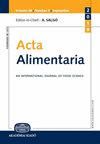重新思考预防性过敏原标签——阈值剂量、风险评估方法和分析意义
IF 1
4区 农林科学
Q4 FOOD SCIENCE & TECHNOLOGY
引用次数: 0
摘要
在过去的几十年里,随着食物过敏的流行率不断上升,食物过敏成为公众健康和食品安全的主要关注点,而他们唯一可用的治疗方法是严格的消除饮食,这需要适当的食品标签规定。虽然此类法规在世界各地都有,但大多数法规都没有考虑到无意中的过敏原交叉污染,通常也没有定义可以支持行业为过敏消费者提供可靠食品标签的阈值剂量。这导致了“可能含有”型预防性过敏原标签(PAL)的激增,该标签是自愿的,旨在警告消费者可能被未申报的过敏原意外污染。由于这种标签几乎从未基于实际风险评估,这使行业和消费者都陷入了困境。解决这一问题的一个有前途的工具可能是基于临床数据的过敏原阈值剂量,这些数据越来越可用。这篇综述旨在介绍这一过程,它开启的改进风险评估的新方法,以及它对食品分析的影响。本文章由计算机程序翻译,如有差异,请以英文原文为准。
Rethinking precautionary allergen labelling – Threshold doses, risk assessment approaches and analytical implications
Food allergies became a major public health and food safety interest in the past decades as their prevalence is increasing, and their only available treatment is a strict elimination diet that necessitates appropriate food labelling regulations. While such regulations are available worldwide, most of them are not taking into account inadvertent allergen cross-contamination and they usually do not define threshold doses that could support the industry in their endeavour to provide reliable food labels for allergic consumers. This resulted in the proliferation of the “may contain” type precautionary allergen labelling (PAL), which is voluntary and is intended to warn consumers for potential unintended contamination with an otherwise undeclared allergen. As this kind of labelling is hardly ever based on actual risk assessment, it puts both the industry and the consumer into a difficult position. A promising tool towards the solution of this problem could be allergen threshold doses based on clinical data, which are becoming increasingly available. This review intends to present this process, the new ways of improved risk assessment it opens, and its implications for food analysis.
求助全文
通过发布文献求助,成功后即可免费获取论文全文。
去求助
来源期刊

Acta Alimentaria
农林科学-食品科技
CiteScore
1.80
自引率
0.00%
发文量
47
审稿时长
18-36 weeks
期刊介绍:
Acta Alimentaria publishes original papers and reviews on food science (physics, physical chemistry, chemistry, analysis, biology, microbiology, enzymology, engineering, instrumentation, automation and economics of foods, food production and food technology, food quality, post-harvest treatments, food safety and nutrition).
 求助内容:
求助内容: 应助结果提醒方式:
应助结果提醒方式:


